Stuttgarter Str. 19
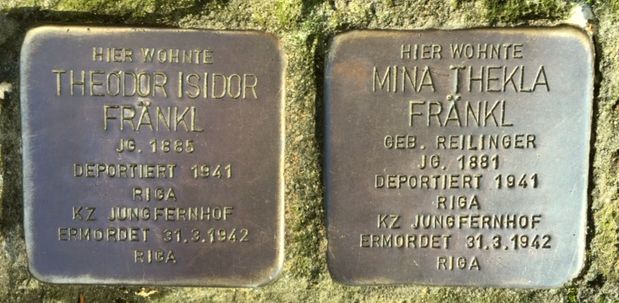
Mina’s First Marriage to Salo Brauer
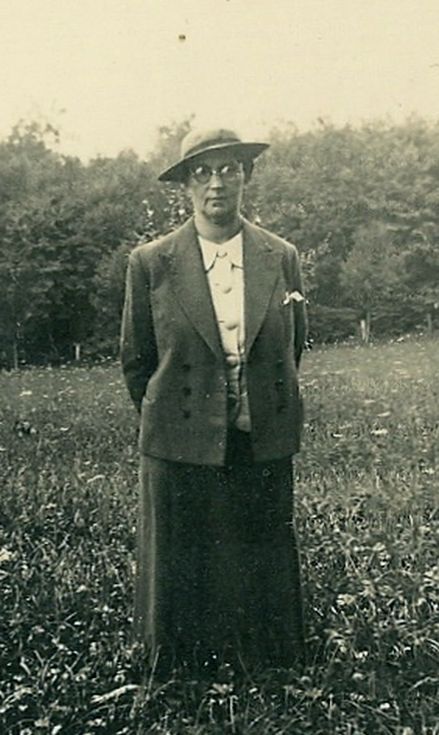
Mina Tekla Fränkl, née Reilinger, widowed Brauer, was born on April 20, 1881, in the town of Reilingen in Baden. Documented is that she was the ninth of ten known children of Josef Reilinger and his wife Frieda, née Strassburger. Prior to 1870, there were no official registry offices in Baden; therefore it is possible that there might have been other siblings whose births were not recorded. The profession of the father is listed as “merchant.”
It could not be determined if Mina had vocational training and education, but later she would prove to be a successful businesswoman.
At the age of 23 she married Salo (Salomon) Brauer who came from Pyskowice/Upper Silesia. The wedding took place in Hockenheim, a town near Reilingen. The couple’s only child, their son Lothar, was born six years later in October 1910. Mina and Salo Brauer probably lived in Stuttgart for several years where Salo Brauer might have worked in the men’s clothing store of Alfred Sűsskind. This entrepreneur had started branch stores in several towns which did business under the name of ‘Sűsskind’s Clothing Store’. Starting in November 1900, one of these stores was located at Marktstrasse 5 in Gőppingen and can be seen on photographs out of that time. Aron Tänzer noted: “Founded in 1900 by Alfred Sűsskind from Stuttgart, the business was managed by Salo Brauer.”
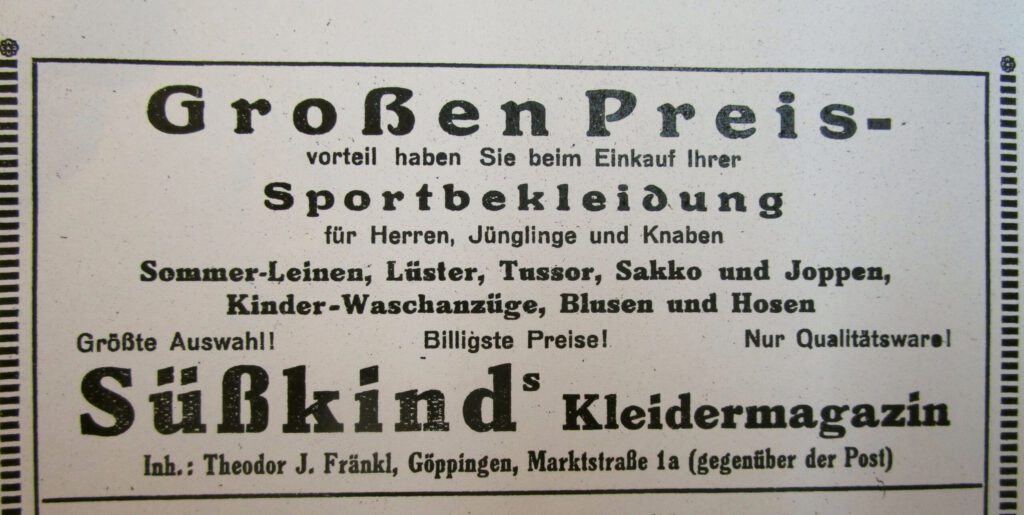
The Brauers must have started living in Gőppingen no later than the end of 1910. Probably Mina’s widowed mother Frieda Reilinger also lived with them – it is recorded that she died in December 1924 in Gőppingen.
World War I destroyed Mina Brauer’s normal way of life. On December 2, 1914, her husband was killed as a Landwehr soldier in France and left behind his wife in a desperate situation: as a widow with small child, an old mother in need of care and a business without someone to manage it. Mina Brauer probably had to fend for herself until 1917. After that time she might at least have received some help with the business from Isidor Fränkl who came from Munich and had lived in Gőppingen since the fall of 1911.
A Nice Gentleman from Munich
Isidor Theodor Fränkl must not have liked his first name and preferred to be called only ‘Theodor’. He was born in September 1885 as the only child of Nanette Fränkl, who was not married. Her job is listed as ‘shop assistant’, later as ’Directrice’(manager), so it can be assumed that she had qualified as a sales person. She died in 1924 in Munich at the age of 60. It is possible that Isidor, as the child of a single mother, developed early in life a sense of empathy and responsibility which he often displayed later in life. He received his training and education as a businessman and then left Munich – however that date is not known. Also unknown, because not documented, is whether he took part on the World War I. But the exact day on which he married Mina Brauer in Gőppingen is recorded: July 21, 1919, witnesses to the marriage were Ludwig Reilinger, probably a relative of Mina, as well as the Catholic Gőppingen businessman Albin Greis.
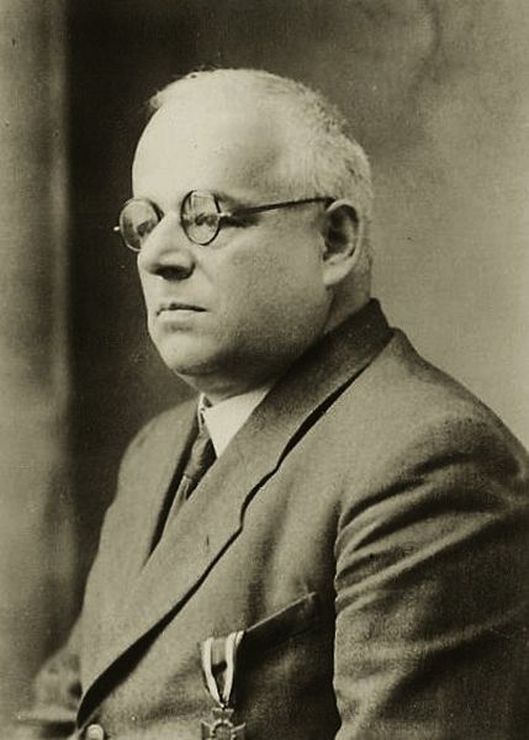
Their marriage can be looked at from different viewpoints: on one side, Isidor, who is described in the restitution files as “without means”, married a wife with some property. On the other side, he must have wanted to take his wife’s child and mother into his home. The demands of his job must have been considerable since he took over the business during the difficult years after the war. Court records indicate that Isidor was considered the owner since 1920; his wife was listed as general manager. The location of the store and living quarters changed in 1920. The Fränkls sold the building at Marktstrasse 5, where they had lived above the store on the second floor, to Heinrich Hőrlein, and bought a smaller building at Marktstrasse 1a, which is still standing today. Above the store which was on the ground floor the couple had three rooms on the second floor and another one in the attic. As a middle-class family they employed a maid who was ‘the daughter of butcher Hoyler from Heiningen.’
But during the crisis years of the Weimar Republic, the business of the Fränkls started to fail: in 1930 settlement proceedings with their creditors began. A recommendation by the Board of Trade of Reutlingen stated: “The owner of the firm is known to be an industrious, honorable businessman who deserves the protection of the composition. No personal debts are included in the breakup of the business property. The solvency difficulties originated because of the general economic crisis. No malicious delay in application for settlement could be determined. The Chamber suggests a settlement rate of 50%.” The court followed this recommendation, and the settlement proceedings were completed in October 1930.
Unfortunately this did not protect the business, and bankruptcy had to be declared in 1932.
Just like they did twelve years before, the Fränkls had to sell the building at Marktstrasse 1a to the Matheis Company. They opened a new store at Kirchstrasse 23; the store itself was rented out, and probably in the beginning the living quarters were located in the house. Between April and September 1934, the couple lived at Lessingstrasse 4 – son Lothar was already living on his own. After that they moved to Stuttgarterstrasse 19. The store was dissolved in June 1935. Isidor Fränkl applied for a journeyman’s license, but it could not be verified if he ever received one.
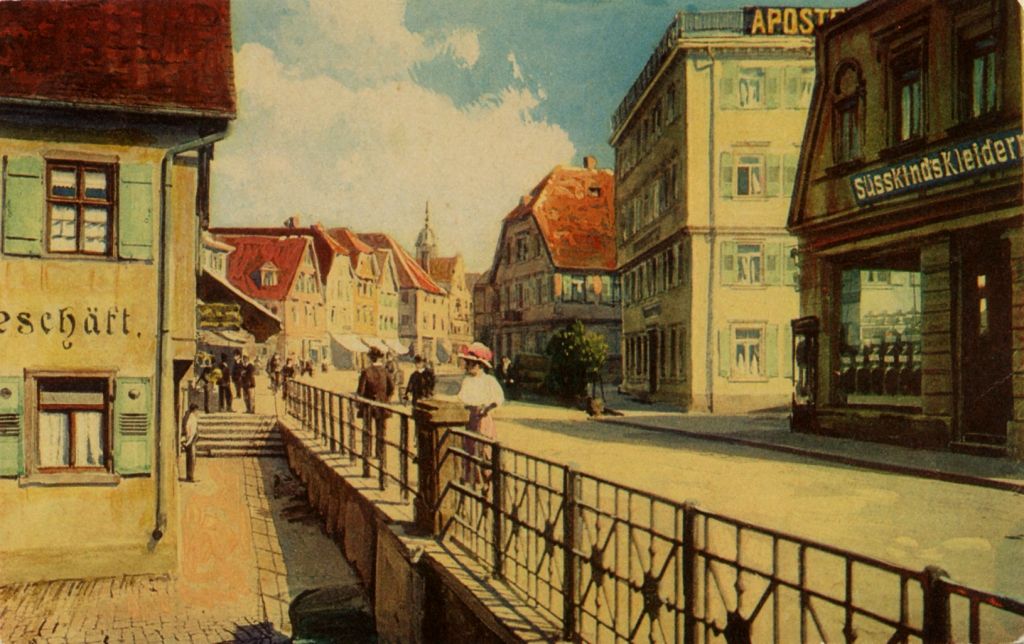
Outcasts
How did Minas and Isidors all-day-living look like under the Nazi regime?
At least the housing situation in Stuttgarterstrasse can be reconstructed out of the restitution records: They lived in four rooms on the ground floor, three of which were about 180 square feet each, and a smaller one about 100 square feet. A fellow tenant, Mrs. Luise Klingenstein, made this statement about her apartment neighbors: “At that time, the Fränkls already had to resort to selling belongings for their livelihood.” Mrs. Fränkl offered to sell her a couch, a fur jacket and a gold pocket watch, but Mrs. Klingenstein could not afford to buy them. The household “still had the appearance of being fairly well off”, at least in the opinion of neighbor Klingenstein. She further testified: “The family lived very secluded, and I cannot imagine that they had many friends. I almost think that I was the only one who had any contact with them.” This statement seems correct if it refers to contact with ‘Aryan’ Germans. But letters that had been written to their son who had fled to Brazil show that the Fränkls still had many contacts with Jewish friends and relatives. In order to increase their income the couple regularly rented out a room to Jewish bachelors for whom Mrs. Fränkl also did the cooking.
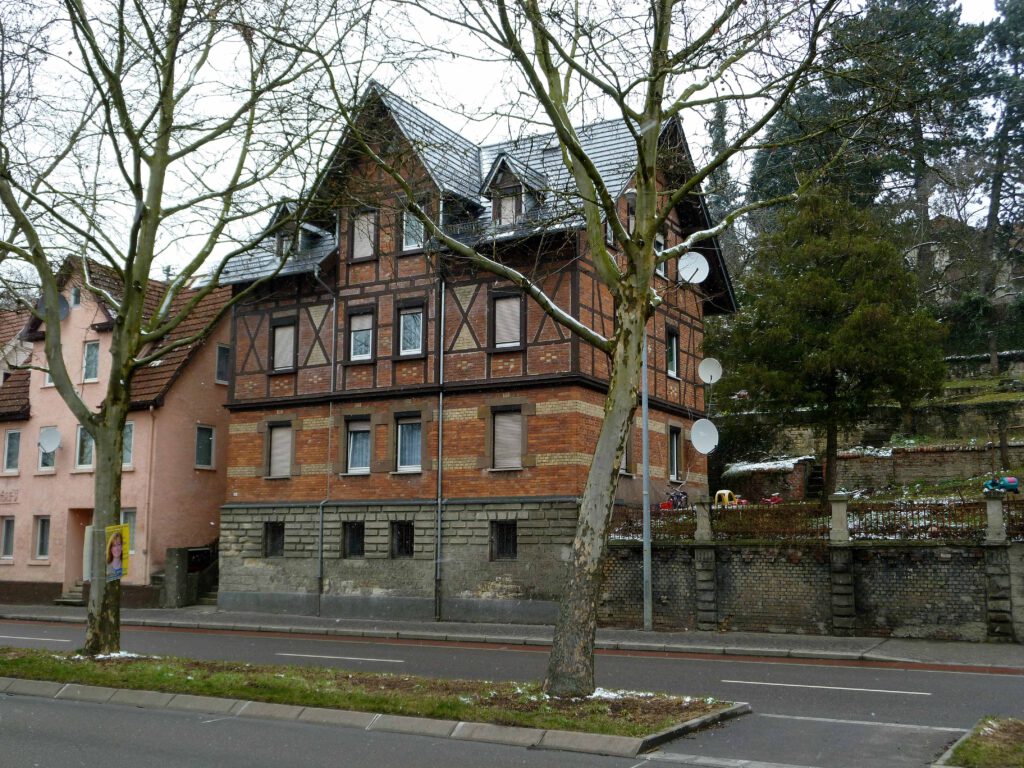
Isidor, who was forced into inactivity because of the loss of the store, carried out new tasks: “The husband helped his wife quite a bit with the running the household, and I repeatedly saw him beating and cleaning the carpets,” remembered neighbor Emma Haug in 1962.
Correspondence from August 1938 with the Brazilian consulate in Berlin is still preserved in which visas were requested, but they already were denied two days later. The attempts by their son to make their escape to Brazil possible also failed, most likely because the money for the sponsorship could not be obtained.
The ‘Journey’ to Dachau
A letter dated December 9, 1938, mentions Isidor’s incarceration at Dachau concentration camp:
“I just received a letter from your dear father from Dachau, and it is terrible for him, he writes that I should send you his greetings and that you should do your very best to speed up our emigration. At the end of the letter he sends you special greetings across the ocean, and you should write to him. Haste is of the utmost urgency. You can imagine what worries we have.” And further: “I was in Stuttgart to visit Durlacher, Dr. Lamm is back home and was released early because he was a front-line soldier, maybe your dear father will also be released soon. May God grant it…”
“… We Want to Leave at Any Cost”
On December 28 Isidor was released from Dachau concentration camp, and two days later he reassured his stepson: “Dearest Lothar! I arrived safely back home from the trip, G s D (thanks to God) and received your dear letters of November 9 and December 8. In the meantime you probably have the requested documents in hand. I hope that you are well. It is now of utter urgency to have definite news in hand because we have to get away from here and we have to leave at any cost. If the entry of Jews to South America is denied, should we try to get to North America?” He carries on “that I am still healthy after everything I had to endure proves my travel destination of the last seven weeks. I am completely healthy, G.s.D. (thanks to God)”
Isidor wrote in an undated letter, probably end of 1939: “It is questionable if we will be able to remain in our home. That will be determined when the orders concerning the residing of J. (Jews) are published, Mr. Pulvermüller of Housing Office thinks. All J. (Jews) have to leave Aryan houses. That is the start of creating ghettoes.”
In fact, the couple had to leave their apartment at Stuttgarterstrasse. In a letter from January 1941, the return address is listed as the ‘Jewish House’ at Geislinger Strasse 6.
Their desperate attempts to flee from Nazi Germany had failed. The last letter which was received and which was dated June 27, 1941, ended with the postscript: “N.B. Should we have to travel, every effort must be made to expedite our emigration. Father.”
On November 28, 1941, Mina and Isidor Fränkl were deported to Riga, together with 39 other Jewish citizens from Gőppingen. They survived the icy cold of the winter in extremely insufficient housing at the Jungfernhof estate. Their murder by German firing squads took place in the days following March 26, 1942 in the woods of Bikernieki.
From Mina’s immediate family, her younger sister Thekla Sander, née Reilinger, who lived in Coburg, was also murdered in Riga. Mina’s niece Fanny Grete Sondheim and her husband Hermann, who lived in Frankfurt/Main, died violently in the Lodz ghetto.
Lothar Brauer’s Flight
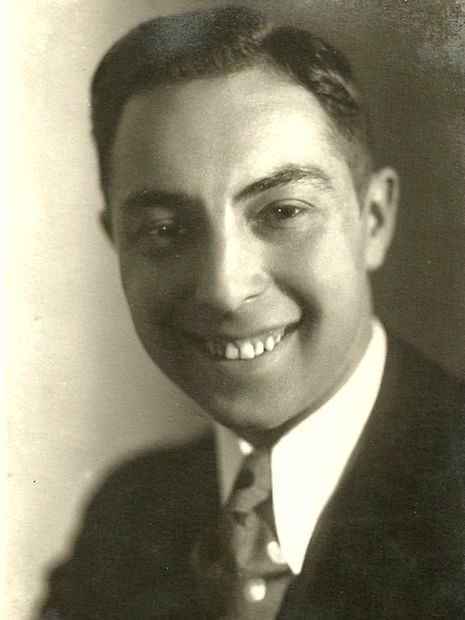
Why flee to Brazil? Lothar Brauer’s daughter Vera explains: ”At that time, in 1936, Brazil was one of the country which were very helpful with making emigration from Germany possible. Someone had to be living there who could make a request for the person in Germany and had to make a deposit of money. Then the person received a visa. My father entered the country on a tourist visa which caused some difficulties. The Jewish community in Sao Paulo was very helpful to him. Unfortunately he did not have the necessary funds to send for his parents. Later the Brazilian government would no longer facilitate Jewish immigration.”
Lothar, who first had to learn the Portuguese language, worked in a matzo bakery, then in a restaurant. He was able to establish himself once he became the manager of a paints factory. In his new home country he met Liselotte Gerson who had fled at the age of 19 from Metternich near Koblenz. In January 1946 the couple married in Sao Paolo and nine months later their son Manfred was born, three years later their daughter Vera. Sadly Manfred died when he was barely 20 years old. In 1984 Liselotte and Lothar Brauer accepted the invitation of Lord Mayor Haller and visited Gőppingen. Lothar Brauer died in 2000; his wife Lieselotte passed away in April 2017 in Sao Paulo. Their daughter Vera studied languages and worked for 20 years as a secretary for an international firm. The Stumbling Stones Initiative would like to thank Mrs. Terra-Brauer for the many documents on her family which she made available.
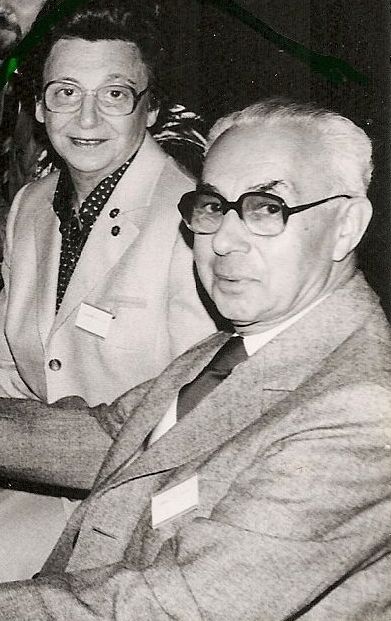
On November 25, 2011, Gunter Demnig laid Stumbling Stones in memory of Mina and Isidor Fränkl in front of the house at Stuttgarterstrasse 19.
(10.05.2024 kmr/ir/ww)
Kurt and Rolf Reilinger
The Historican Karl Kassenbrock researched the Fate of Lothar Brauers Cousins Kurt and Rolf Reilinger. Both were Sons of Minas oder Brother Samuel Reilinger and his non-jewish wife Juliane, living in Stuttgart. We gratefully thank Herr Reilinger for his research. A short abstract about his research below.
Kurt and Rolf (Roda) Reilinger – Mina Fränkls Nephews
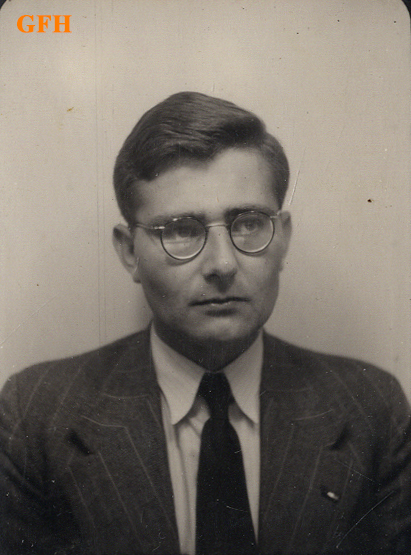
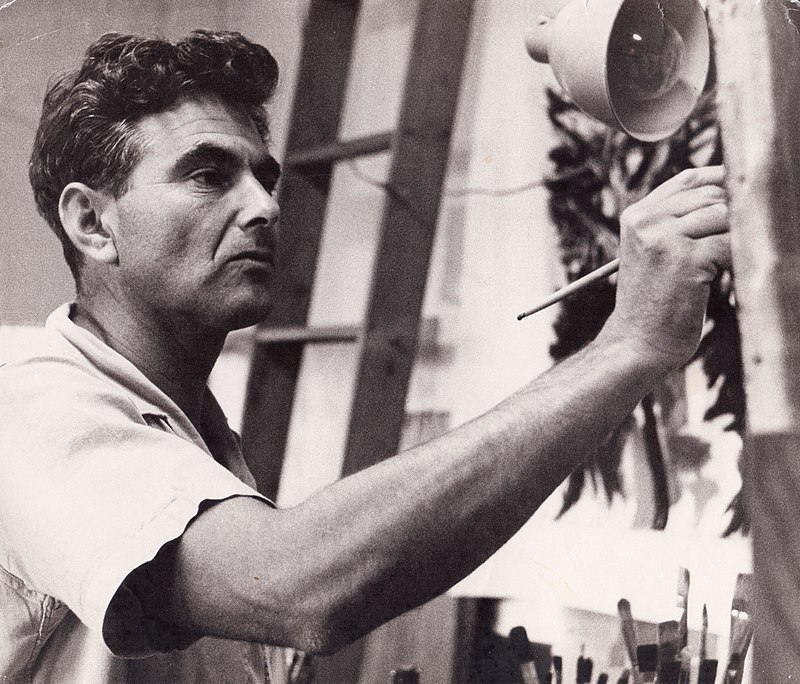
We want to mention as well the two Nephwes of Mina Fränkl/Brauer nèe Reilinger. Minas Brother Samuel Reilinger (*10.11.1866) had two later born Sons with his catholic Wife Juliana nèe Braun (*08.04.1880): Kurt Reilinger (*05.12.1917) and Rolf Reilinger (*06.07.1919).
To the Nationalsozialisten they were Jews because they belonged to the Jewish religious community althoug the catholic Mother.
Kurt Reilinger emigrated 1939 to the Netherlands. He went to the underground and was a leading member oft the netherland-jewish Westerweel-Group, which helped lots of young Jews across the Belgian Border to get to France and Spain.
1944 he got arrestet and deported to KZ Buchenwald. He survived in the KZ-Außenlager “5. SS-Eisenbahnbaubrigade” in Osnabrück, but died immediatly after his return to the Netherlands by traffic acident 16.09.1945.
Rolf Reilinger emigrated to Palestine in1939. By the Name Roda Reilinger he was in Arts. He created know sculptures like “Arche Noah” in Mollepark Aalborg in Denmark and the “Burning Rosetree” in front of the Synagoge in Stuttgart. He died 2003 at Kibbuz Hasorea in Israel.
Karl Kassenbrock, Nov. 2018
Karl Kassenbrock published a more detailed account of Kurt and Rolf Reilinger in Osnabrücker Nachrichten No. 123.
(13.01.2019 kmr)


Leave a Reply